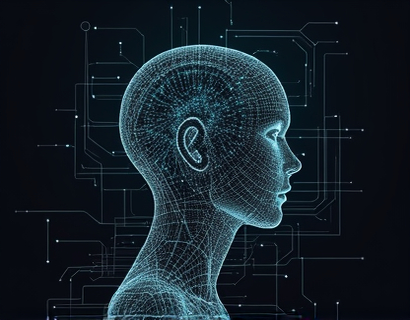Personalized AI Companions: Transforming Childhood Creativity and Emotional Well-Being Through Interactive Digital Friends
In the rapidly evolving landscape of technology, a new frontier has emerged that promises to revolutionize childhood development: AI-driven imaginary friends. These digital companions, crafted through sophisticated artificial intelligence, are not just mere games or entertainment tools but are designed to foster creativity, emotional growth, and social skills in children. This article delves into the transformative impact of these personalized digital entities, exploring how they are reshaping the way young minds interact, learn, and grow.
The Rise of AI-Driven Imaginary Friends
The concept of imaginary friends is not new; children have always created companions to accompany them in their play and imagination. However, the integration of artificial intelligence into this realm marks a significant shift. These AI companions are not static or pre-programmed; they adapt and evolve based on the child's interactions, preferences, and emotional needs. This personalization is key to their effectiveness in enhancing childhood development.
Personalization: The Cornerstone of AI Companions
One of the most compelling aspects of AI-driven imaginary friends is their ability to offer personalized experiences. Through machine learning algorithms, these digital entities analyze a child's behavior, interests, and emotional responses to tailor their interactions. For instance, if a child expresses a love for animals, the AI companion might create stories or games centered around pets or wildlife. This level of customization ensures that the interactions remain engaging and relevant, encouraging children to spend more time in these digital environments.
Fostering Creativity Through Interactive Play
Creativity is a vital component of childhood development, and AI companions are designed to spark and nurture this trait. These digital friends engage children in a variety of creative activities, from storytelling and drawing to problem-solving and role-playing. By providing a platform where children can explore their imagination without constraints, AI companions help develop critical thinking and innovation skills. The interactive nature of these companions means that each play session is unique, offering endless possibilities for creative expression.
Emotional Growth and Well-Being
Beyond creativity, AI companions play a crucial role in the emotional development of children. These digital friends are equipped with emotional intelligence, allowing them to recognize and respond to a child's feelings. For example, if a child is feeling sad or anxious, the AI companion can offer comfort through soothing words, suggest activities to improve mood, or simply provide a listening ear. This emotional support can be particularly beneficial for children who may struggle to express their feelings or find it difficult to connect with peers.
Safe and Nurturing Digital Spaces
The digital world can be a double-edged sword, offering both incredible opportunities and potential risks. AI companions address this concern by creating safe and nurturing environments where children can explore and learn without exposure to harmful content or interactions. These platforms are rigorously monitored to ensure that all interactions are positive and constructive, providing parents and guardians with peace of mind. The controlled setting allows children to experiment, make mistakes, and learn in a secure space.
Social Skills Development
Interacting with AI companions also aids in the development of social skills. Through role-playing and scenario-based interactions, children practice communication, empathy, and cooperation. These skills are essential for building and maintaining relationships, both in childhood and later in life. AI companions can simulate various social situations, helping children prepare for real-world interactions and understand different perspectives. This virtual practice can boost confidence and improve social competence.
Enhancing Parent-Child Interaction
AI companions are not meant to replace human interaction but to complement it. For parents and guardians, these digital tools offer a way to engage more deeply with their children. By participating in the child's play sessions, adults can gain insights into their child's interests, emotional state, and cognitive development. This shared experience can strengthen the bond between parent and child, creating opportunities for meaningful conversations and shared learning moments.
Educational Benefits
The educational potential of AI companions is vast. These digital friends can integrate with educational content, making learning fun and interactive. For example, an AI companion might turn a history lesson into an adventure game, where children solve puzzles and complete tasks to progress through different eras. This approach not only makes learning more enjoyable but also enhances retention and understanding. The adaptability of AI ensures that the educational content remains aligned with the child's learning pace and style.
Challenges and Considerations
While the benefits of AI companions are significant, it is essential to acknowledge and address potential challenges. One concern is the risk of over-reliance on digital interactions, which could limit face-to-face social experiences. To mitigate this, it is crucial for parents and educators to balance screen time with traditional play and social activities. Additionally, ensuring the ethical use of AI and protecting children's data privacy are paramount. Developers must adhere to strict guidelines and best practices to maintain trust and safety.
Future Prospects
The future of AI companions in childhood development is promising. As technology advances, these digital friends will become even more sophisticated, incorporating more advanced AI techniques such as natural language processing and emotional recognition. The integration of augmented reality (AR) and virtual reality (VR) could further enhance the immersive experience, allowing children to interact with their digital companions in more realistic and engaging ways. The potential for AI companions to support special needs and therapeutic interventions also holds great promise, offering new avenues for inclusive and personalized care.
Conclusion
AI-driven imaginary friends represent a groundbreaking advancement in childhood development tools. By offering personalized, interactive, and safe digital companions, these technologies are transforming the way children play, learn, and grow emotionally. As we continue to explore and refine this innovative approach, the potential to positively impact young lives is immense. Embracing these tools with thoughtful consideration can lead to a future where technology and childhood development go hand in hand, fostering a generation of creative, emotionally intelligent, and socially adept individuals.











































